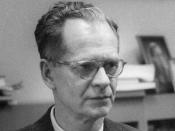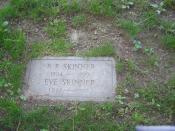Is it possible for psychologists to ever understand the human condition well enough to create a utopia by "engineering" human behavior? This is the challenge thrown out by behavioral psychologist, B.F. Skinner in his novel, Walden Two (1948). Well written and entertaining, Walden Two is directed to the layman rather than to the professional psychologist. It concerns a fictitious intentional community of 1,000 started by one Frazier (no first name or title ever mentioned) who applies the tools of behavioral modification to make of Walden Two the best of all possible worlds.
Skinner's technique as a propagandist is to show us Walden Two through the eyes of various outsiders who possess varying degrees of skepticism and enthusiasm for the community. The reader can identify with one or another of these visitors depending on his own inclinations. Skinner/Frazier is provocative in his claims, deliberately so, in my opinion, as another technique in breaking down resistance.
The more we resist an idea, the more power it draws from our very resistance. He begins with teasers, ideas which have interest and merit on their own but which are fairly trivial and extrinsic to his central thesis. The reader and the skeptical visitors sense he is trying to soften them up and stiffen their backs all the more. A philosophy professor named Castle is the main bearer of resistance. Skinner looks down upon philosophy as a form of navel gazing and Castle is made an easy target. More serious reservations come from the narrator, a psychology professor named Burris. However, Burris also serves as a voice for Skinner and much conversation between him and Frazier is like an internal dialogue within Skinner, himself. The party is completed by two young men and their girlfriends. The guys and one of the girls are the enthusiasts...


